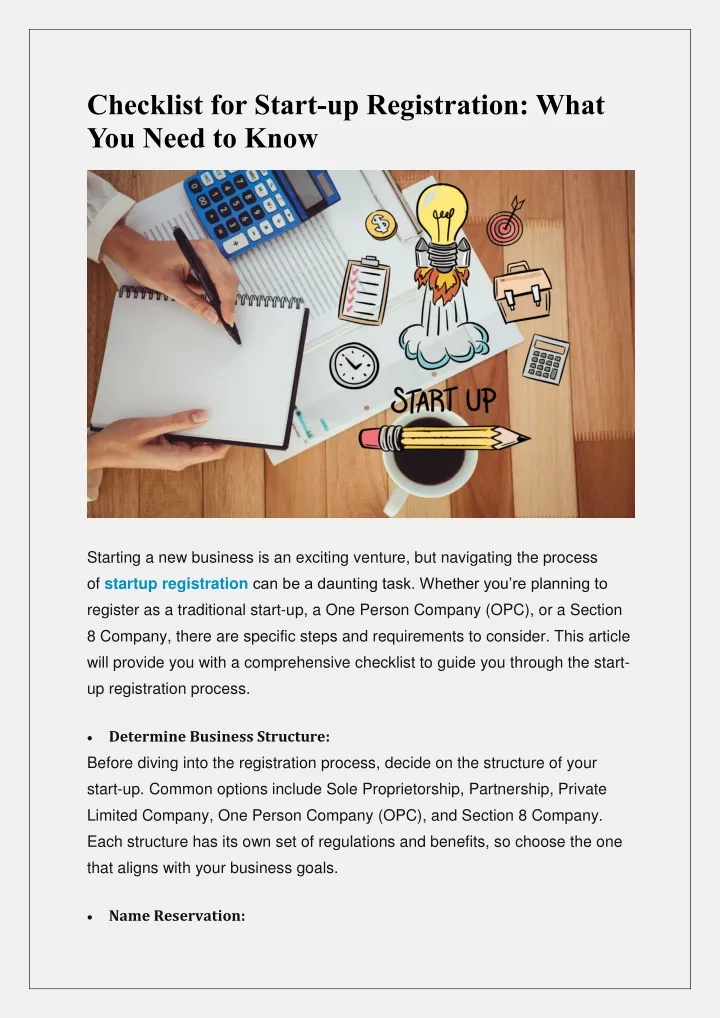
Startup Registration Checklist: Your Essential Guide to Legally Launching Your Dream Business
Starting a new business is an exhilarating journey. You’ve got the big idea, the passion, and the drive to make it happen. But amidst the excitement of developing your product or service, securing funding, and building your team, there’s a crucial step that often feels daunting: startup registration.
Don’t let the legal jargon intimidate you! Registering your business properly from the outset is not just a legal formality; it’s a foundational step that provides credibility, protects your personal assets, opens doors to funding, and ensures smooth operations down the line.
This comprehensive guide is designed specifically for beginners. We’ll break down the entire startup registration checklist into easy-to-understand steps, complete with subheadings and bullet points, so you can confidently navigate the process and build your business on a solid legal footing.
Why Register Your Startup? The Benefits You Can’t Ignore
Before we dive into the "how," let’s quickly understand the "why." Proper business registration offers a multitude of advantages:
- Legal Protection: Separates your personal assets from your business liabilities. If your business faces a lawsuit or debt, your personal savings, home, and other assets are typically protected.
- Credibility & Professionalism: A registered business signals seriousness and trustworthiness to customers, suppliers, partners, and investors.
- Access to Funding: Banks and investors typically require your business to be a legally recognized entity before they’ll consider providing loans or investments.
- Tax Benefits: As a registered entity, your business may be eligible for certain tax deductions and benefits that aren’t available to individuals.
- Hiring Employees: You cannot legally hire employees without an Employer Identification Number (EIN), which requires registration.
- Branding & Trademarks: Registering your business name and potentially your brand elements helps protect your intellectual property.
- Compliance: Ensures you’re operating within the law, avoiding penalties and legal issues down the road.
The Ultimate Startup Registration Checklist: Step-by-Step
Let’s get down to business! Here’s a detailed checklist to guide you through the startup registration process.
1. Solidify Your Business Plan & Vision
Before you even think about forms and filings, have a clear understanding of your business. This foundational step informs every decision that follows.
- Define Your Business Model: What problem does your business solve? Who are your target customers? How will you generate revenue?
- Conduct Market Research: Understand your industry, competitors, and target audience. Is there a demand for your product/service?
- Outline Your Services/Products: What exactly will you sell?
- Determine Your Founding Team: Who are the key players? What are their roles and responsibilities?
2. Choose Your Business Legal Structure (Crucial Decision!)
This is perhaps the most important decision you’ll make in the early stages. Your business structure affects everything from liability to taxation and administrative burden. Don’t rush this step; consider consulting with an attorney or accountant.
Here are the most common structures, explained simply:
-
Sole Proprietorship:
- What it is: The simplest and most common structure for single-owner businesses. You and your business are legally the same entity.
- Pros: Easy and inexpensive to set up, minimal paperwork.
- Cons: No personal liability protection (your personal assets are at risk), harder to raise capital.
- Best for: Freelancers, independent contractors, very small businesses with low risk.
-
Partnership (General or Limited):
- What it is: Similar to a sole proprietorship, but with two or more owners. A General Partnership means all partners share in management, profits, and unlimited personal liability. A Limited Partnership (LP) has both general partners (with liability) and limited partners (investors with limited liability).
- Pros: Relatively easy to set up, shared workload and resources.
- Cons: General partners have unlimited personal liability, potential for disputes among partners.
- Best for: Businesses with two or more owners where personal liability isn’t a major concern, or where some partners are purely investors (LP).
-
Limited Liability Company (LLC):
- What it is: A hybrid structure that combines the limited liability of a corporation with the pass-through taxation and flexibility of a partnership or sole proprietorship.
- Pros: Protects personal assets from business debts and lawsuits, flexible taxation options, less complex than a corporation.
- Cons: Can be more expensive to set up than a sole proprietorship/partnership, some states have annual fees.
- Best for: Most small to medium-sized businesses that want personal asset protection without the complexity of a corporation.
-
Corporation (C-Corp or S-Corp):
- What it is: A separate legal entity from its owners, offering the strongest personal liability protection.
- C-Corp: The most common corporate structure, subject to "double taxation" (corporate profits are taxed, and then dividends paid to shareholders are taxed again). Best for businesses looking to raise significant capital from investors and eventually go public.
- S-Corp: Avoids double taxation by passing income, losses, deductions, and credits through to its shareholders’ personal income. Has strict eligibility requirements (e.g., limited number of shareholders).
- Pros: Strongest personal liability protection, easier to raise capital, perpetual existence.
- Cons: Most complex and expensive to set up and maintain, significant regulatory requirements and paperwork.
- Best for: Businesses seeking external investment, planning to go public, or those with complex ownership structures.
Key Takeaway: Consult a legal or financial professional to determine the best structure for your specific business goals, risk tolerance, and tax situation.
3. Name Your Business & Register It
Your business name is your identity! This step involves more than just picking a cool name.
- Choose a Unique Name: Brainstorm names that are memorable, relevant, and easy to pronounce/spell.
- Check Name Availability:
- State Level: Check your chosen state’s Secretary of State website to ensure your desired business name isn’t already taken by another registered entity.
- Federal Level (USPTO): If you plan to trademark your business name (highly recommended for brand protection), check the U.S. Patent and Trademark Office (USPTO) database.
- Domain Name: Check if the corresponding website domain name (.com is preferred) is available.
- Social Media Handles: See if your desired handles are available on major platforms.
- Register Your Business Name:
- For LLCs/Corporations: Your name is typically registered with your state’s Secretary of State when you file your formation documents (e.g., Articles of Organization for an LLC, Articles of Incorporation for a corporation).
- "Doing Business As" (DBA) or Fictitious Name: If you’re a sole proprietor or partnership, and you plan to operate under a name different from your own legal name (e.g., "Jane Doe Photography" instead of just "Jane Doe"), you’ll likely need to register a DBA with your county or state.
4. Obtain an Employer Identification Number (EIN)
Think of an EIN as your business’s Social Security Number. It’s a unique nine-digit number assigned by the Internal Revenue Service (IRS).
- Who Needs It:
- Any business with employees.
- Corporations or Partnerships.
- LLCs electing to be taxed as a corporation.
- Some sole proprietorships (if you have employees or file certain excise tax returns).
- How to Get It: You can apply for an EIN for free directly through the IRS website. It’s a quick online application that usually takes just a few minutes.
5. Open a Business Bank Account
Once your business is legally registered and you have your EIN, open a separate bank account specifically for your business.
- Why It’s Essential:
- Separation of Funds: Crucial for personal asset protection (especially for LLCs and corporations). It creates a clear boundary between your personal and business finances.
- Easier Bookkeeping: Simplifies tracking income and expenses for tax purposes.
- Professionalism: Looks more legitimate to clients and suppliers.
- What You’ll Need: Typically your EIN, a copy of your business formation documents (e.g., Articles of Organization), and a valid ID.
6. Apply for Federal, State, and Local Licenses & Permits
This is where things can get a bit complex, as requirements vary widely based on your industry, location, and business activities.
- Federal Licenses/Permits: Certain industries are regulated at the federal level (e.g., agriculture, alcohol, firearms, transportation, broadcasting). Check with relevant federal agencies like the FDA, FCC, or USDA.
- State Licenses/Permits: Most states require a general business license. Beyond that, many industries have specific state-level licensing requirements (e.g., professional licenses for doctors, lawyers, hairdressers; permits for restaurants, construction).
- Local Licenses/Permits (City/County): Don’t forget your local government! You’ll often need:
- General Business License: Most cities/counties require this to simply operate within their jurisdiction.
- Zoning Permits: If you’re operating from a physical location, ensure it’s zoned for your type of business.
- Health Permits: For businesses handling food.
- Building Permits: For any construction or significant renovations.
- Occupancy Permits: To ensure your building is safe for its intended use.
How to Find Out:
- Check your state’s Secretary of State website or Department of Commerce.
- Visit your city and county clerk’s office websites.
- Utilize online resources like the Small Business Administration (SBA) website, which often provides links to state-specific business resources.
7. Understand and Plan for Taxes
Business registration is intertwined with tax obligations. Even if you haven’t made a sale yet, understanding your tax responsibilities is vital.
- Federal Taxes:
- Income Tax: How your business is structured determines how it’s taxed (e.g., pass-through for sole proprietorships/partnerships/S-Corps, corporate tax for C-Corps).
- Payroll Taxes: If you have employees.
- Self-Employment Tax: For sole proprietors and partners.
- Estimated Taxes: Many small businesses pay estimated taxes quarterly.
- State Taxes:
- State Income Tax: If applicable in your state.
- Sales Tax: If you sell goods or certain services, you’ll likely need to collect and remit sales tax. You’ll need to register with your state’s Department of Revenue or equivalent.
- Employment Taxes: For state unemployment insurance, etc.
- Local Taxes:
- Property Tax: If you own commercial property.
- Occupancy Tax: For certain businesses like hotels.
- Local Sales Tax: In some jurisdictions.
Recommendation: Consult with a qualified accountant or tax professional. They can help you understand your specific tax obligations, set up proper accounting systems, and ensure you meet all deadlines.
8. Protect Your Intellectual Property (IP)
Your brand, ideas, and creations are valuable assets. Consider protecting them early.
- Trademark: Protects your brand name, logo, slogans, and other identifying marks. Register with the USPTO for federal protection.
- Copyright: Protects original works of authorship, such as books, software code, music, art, and website content. While copyright exists automatically upon creation, registering with the U.S. Copyright Office offers stronger legal recourse.
- Patent: Protects inventions (processes, machines, manufactures, compositions of matter). This is a complex and expensive process, usually reserved for truly novel inventions.
9. Draft Essential Legal Agreements
These internal documents define relationships and responsibilities within your company and with external parties.
- Founders’ Agreement: If you have co-founders, this document is critical. It outlines ownership percentages, roles and responsibilities, decision-making processes, intellectual property ownership, and what happens if a founder leaves.
- Operating Agreement (for LLCs): While not always legally required, an Operating Agreement is highly recommended for LLCs. It dictates the internal operations of the LLC, including member roles, voting rights, profit/loss distribution, and procedures for adding/removing members.
- Partnership Agreement (for Partnerships): Similar to an Operating Agreement, this document outlines the rights, responsibilities, and liabilities of each partner.
- Bylaws (for Corporations): These are the internal rules governing a corporation’s operations, including shareholder meetings, board of directors’ duties, and officer roles.
- Non-Disclosure Agreements (NDAs): If you’re sharing sensitive information with potential partners, investors, or contractors.
- Independent Contractor Agreements: If you plan to hire freelancers.
Recommendation: Always have these agreements drafted or reviewed by a qualified business attorney. Using generic templates can lead to significant problems down the line.
10. Understand Ongoing Compliance Requirements
Registration isn’t a one-and-done deal. Businesses have ongoing obligations.
- Annual Reports/Filings: Most states require LLCs and corporations to file an annual report or statement of information with the Secretary of State.
- Tax Deadlines: Stay on top of federal, state, and local tax filing and payment deadlines.
- Meeting Minutes: Corporations (and sometimes LLCs) need to keep records of formal meetings (board, shareholder).
- Business Address Updates: Inform relevant agencies if your business address changes.
- License Renewals: Keep track of renewal dates for all your business licenses and permits.
Common Startup Registration Mistakes to Avoid
- Procrastinating: Delaying registration can lead to legal issues, missed opportunities, and personal liability.
- Choosing the Wrong Legal Structure: This can lead to unnecessary tax burdens, inadequate personal protection, or difficulty raising capital later. Get professional advice!
- Ignoring Licenses and Permits: Operating without the proper licenses can result in hefty fines, business closure, and reputational damage.
- Mixing Personal and Business Finances: This undermines the liability protection of LLCs and corporations and makes bookkeeping a nightmare.
- Not Having a Founder Agreement: This is a recipe for disaster in co-founder relationships.
- Forgetting About Intellectual Property: Failing to protect your brand and ideas early can lead to costly disputes and loss of your unique identity.
- DIY Legal Work Without Understanding: While tempting to save money, using generic templates or trying to navigate complex legalities without professional advice can cost you much more in the long run.
Tools and Resources to Help You
- Small Business Administration (SBA): The official U.S. government resource for small businesses. Their website (sba.gov) has a wealth of information, guides, and local assistance finders.
- Your State’s Secretary of State Website: This is your primary resource for registering your legal entity and checking business name availability.
- IRS Website: For EIN application and federal tax information.
- Local City/County Clerk’s Office: For local business licenses and permits.
- Business Attorney: Indispensable for choosing the right legal structure, drafting agreements, and ensuring compliance.
- Accountant/Tax Professional: Crucial for tax planning, bookkeeping setup, and financial advice.
- Online Legal Services: Companies like LegalZoom or Rocket Lawyer can assist with basic filings, but for complex situations, a dedicated attorney is best.
Conclusion: Your Journey Starts Now!
Registering your startup might seem like a maze of paperwork and legalities, but by following this comprehensive checklist, you can demystify the process. Each step is a building block for a strong, compliant, and successful business.
Remember, you don’t have to do it all alone. Leverage the resources available and don’t hesitate to seek professional advice from attorneys and accountants. Taking the time to properly register your business now will save you countless headaches and potential legal battles in the future, allowing you to focus on what you do best: growing your dream business.
Ready to turn your vision into a legally recognized reality? Start checking off these boxes today!



Post Comment